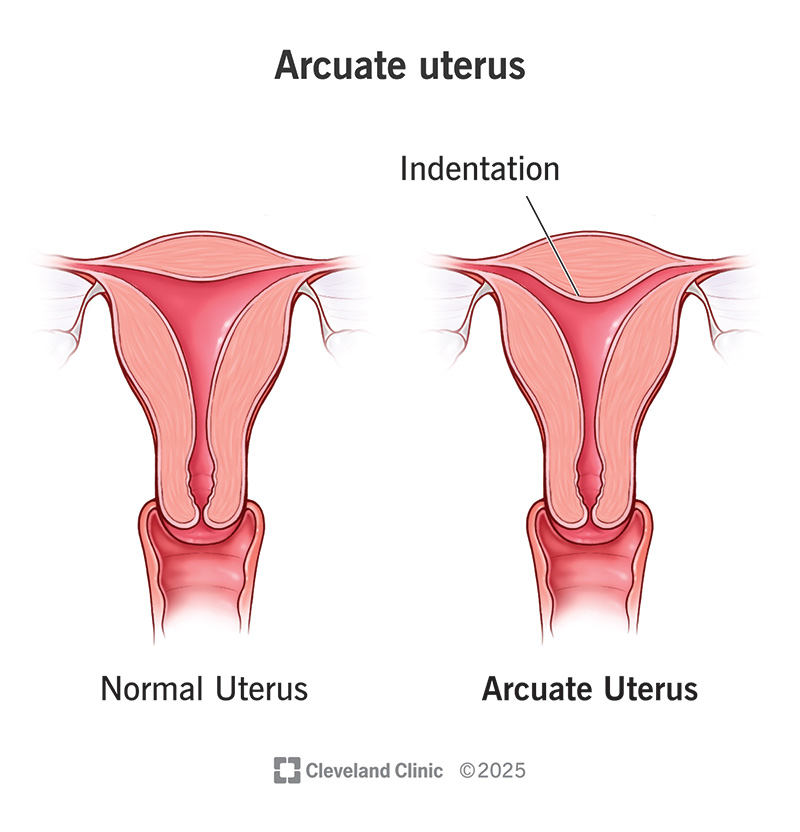An arcuate uterus is a minor irregularity in the shape of your uterus. Unlike a typical pear-shaped uterus, an arcuate uterus has a small dent at the top. It doesn’t cause health concerns and doesn’t require treatment.
Advertisement
Cleveland Clinic is a non-profit academic medical center. Advertising on our site helps support our mission. We do not endorse non-Cleveland Clinic products or services. Policy

Image content: This image is available to view online.
View image online (https://my.clevelandclinic.org/-/scassets/images/org/health/articles/22811-arcuate-uterus)
An arcuate uterus is when the top of your uterus is indented. A typical uterus is slightly rounded at the top. With an arcuate uterus, there’s a tiny dip or dent at the top. The dip is very shallow. It doesn’t significantly change the shape of your uterus.
Advertisement
Cleveland Clinic is a non-profit academic medical center. Advertising on our site helps support our mission. We do not endorse non-Cleveland Clinic products or services. Policy
This condition usually doesn’t cause symptoms or affect your health in any way. You’re born with an arcuate uterus. About 3.9% of all women have one. Many healthcare providers consider it a normal variation (difference) of the uterus and not a true abnormality.
You usually don’t have any symptoms of an arcuate uterus. It doesn’t affect menstruation or pregnancy or cause pelvic pain.
An arcuate uterus is a Müllerian duct anomaly. In typical fetal development, the ducts merge to form one single uterus. But if these ducts don’t fuse, it causes a misshapen uterus. An arcuate uterus means there’s a dent at the top of the uterus where these ducts didn’t fuse.
People with an irregularly shaped uterus usually have a greater chance of endometriosis. But researchers aren’t entirely sure if a strong connection exists between arcuate uterus and endometriosis.
Many people with an arcuate uterus have healthy pregnancies and may never know they have this condition. But one study found that you may have a higher risk of complications, like preterm birth.
Your pregnancy care provider is the best person to talk to about your risk for complications.
No, an arcuate uterus won’t cause a miscarriage. If you have a miscarriage, it’s likely due to another reason.
Advertisement
You usually don’t know you have an arcuate uterus until you have a prenatal ultrasound or transvaginal ultrasound to diagnose another medical condition. Your provider may use an MRI to confirm the diagnosis.
Healthcare providers typically don’t treat an arcuate uterus because it doesn’t cause any health issues. The complications of having surgery to repair it usually outweigh any potential benefits.
Having an arcuate uterus shouldn’t prevent getting pregnant. Your uterus is still able to expand to accommodate a growing fetus. Other types of irregularly shaped uteruses may not be able to expand.
It shouldn’t. You may have a slightly higher chance of your baby being in a breech position. If this happens, you may need a C-section delivery.
A septate uterus is when your uterus is divided into two parts by a thick membrane. A septate uterus can cause pregnancy complications.
An arcuate uterus is a common variation of the typical pear-shaped uterus. As it doesn’t cause any problems, healthcare providers usually consider it to be normal. If you have any concerns or questions about your uterus, don’t hesitate to talk to a healthcare provider. They’re there to listen and help you understand what this means for your health.
Advertisement

Sign up for our Health Essentials emails for expert guidance on nutrition, fitness, sleep, skin care and more.
Learn more about the Health Library and our editorial process.
Cleveland Clinic’s health articles are based on evidence-backed information and review by medical professionals to ensure accuracy, reliability and up-to-date clinical standards.
Cleveland Clinic’s health articles are based on evidence-backed information and review by medical professionals to ensure accuracy, reliability and up-to-date clinical standards.
From routine pelvic exams to high-risk pregnancies, Cleveland Clinic’s Ob/Gyns are here for you at any point in life.
